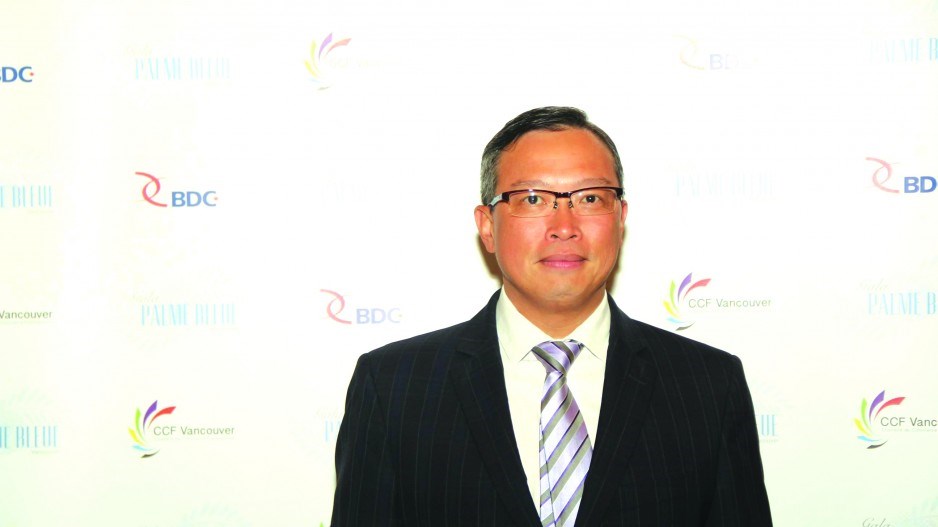Despite a growing membership, the Vancouver Francophone Chamber of Commerce or Chambre de Commerce Francophone de Vancouver (CCFV) is upping its efforts to draw from a wider range of business owners, including anglophones, to ensure the group will have a stronger voice and better visibility in the Lower Mainland.
Chamber president Daniel Wang said the first move in going beyond the two traditional groups from which the CCFV draws members – Québécois and French residents of Metro Vancouver – was the chamber’s push to market this year’s edition of its signature event, the Gala de la Palme Bleue (which took place on October 17), to non-traditional businesses.
The annual awards night was held at the Terminal City Club, and Wang said officials wanted to send the message out to local business owners who have an interest in interacting with the francophone community, regardless of whether or not they come from a French-speaking background.
“The message is ‘We are open for business with the English-speaking community,’” Wang said. “‘We are not an organization that is closed to the world at large. Come see us … we may speak an extra language, but most of us are also English speakers, and we want to do business with everybody.’”
The chamber has about 100 members, but some of the more traditional francophone businesses that may have supported it in the past have migrated out of Metro Vancouver into other areas of B.C. because of the Lower Mainland’s cost of living and the associated challenges with running a small business.
Wang said that because the chamber’s executive team is made up of volunteers exclusively, it lacks the reach to maintain links with francophone business owners if they decide to move to places like Vancouver Island, the Okanagan, Cariboo or Kootenays.
“We are essentially a local organization,” he stressed. “We don’t have tentacles throughout the province, so if people leave Greater Vancouver, we lose them. Because geographically, we just can’t reach them … and we often meet francophone business owners who want to move to Vancouver, to live the Canadian dream – and the reality is that it’s expensive to live here, to put down roots.”
The solution, Wang said, is for the chamber to first be more representative of the francophone population in Metro Vancouver that had been previously untapped. He noted that there are significant numbers of people living in the Lower Mainland from Africa who are francophone, adding that there have been many members of the local Latin American community who have expressed an affinity to French-speaking language and culture.
According to estimates by La Francophonie, the international organization of francophone countries, about 55% of the world’s 212 million French speakers live in Africa, and that percentage is projected to rise.
“The francophone community is much broader than just the Québécois community and the French immigrants from France,” Wang said, noting that his own country of origin is Mauritius, a bilingual island nation off the east coast of Africa. “They come from all parts of the world. There’s a large Mauritian community in Surrey. There are large areas with immigrants from Africa in places like New Westminster. And you have spoken to many residents from Mexico who did their university studies in France. So all of these people are here, they all speak French, and they are all looking for something to resonate with them.”
There are no representatives from an African mainland country sitting on the chamber’s board – something that Wang said he would like to see change.
The play for the hearts of non-francophone businesses with an interest in interacting with the community goes one step beyond the non-French and non-Québécois initiatives. Although the group’s website is in French and its meetings are held in that language, he noted that almost everyone is bilingual, and this year’s Gala de la Palme Bleue included both English and French for presentations such as the keynote speech.
By broadening the proverbial net, Wang said, the chamber is hoping to strengthen the organization as it seeks to ensure francophone business issues are on government radar.
“I think our voice will grow louder, our presence will be seen more clearly, and the benefits for the francophone community could be manifold,” he said. “I think one needs to realize that, if you are a francophone business owner, you also have a family or a house. So the benefits of having a stronger voice may not just be for your business, but for your family and your community.
But if the government does not see you as a strong force, they aren’t interested.”
Perhaps surprisingly, one item that has not significantly boosted business for the francophone chamber as some observers have expected is the Comprehensive Economic and Trade Agreement that Canada has signed with the European Union.
The chamber has not noted an increase in business as some other communities have when free-trade links are set up between Canada and a diaspora population’s country of origin.




